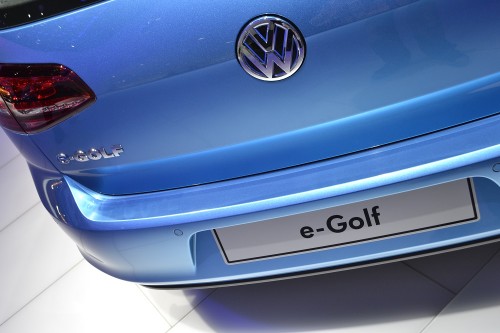It has been confirmed that Volkswagen is working on a powerful new battery for its EV fleet. Speaking at the Geneva Motor Show, Dr. Heinz-Jakob Neusser said that “an 80kWh unit is under development using our own technology. It would provide between three and four times the battery power in a given package.†This means that a battery of equivalent physical size to that used in the new 2015 Volkswagen e-Golf could hold the amount of energy in a top-end Tesla Model S.
Neusser refused to name the specific battery chemistry, but didn’t deny it’s a lithium-air unit. Lithium-air has been a battery holy grail of sorts since the 1970s, but obstacles such as electrolyte degradation, manufacturability, and high cost have prevented the lithium-air takeover that would truly catapult EVs into the mainstream. But improvements on lithium-air technology continue to move forward with recent work by researchers from Mie University in Japan.
The primary distinction between lithium-ion and lithium-air batteries is that lithium-air batteries replace the cathode with air — which results in a notably lighter battery, with the potential to hold in a great deal of energy. Some researchers have stated that these “breathing†batteries could result in EVs with ranges greater than 300 miles a charge.
“Our system’s practical energy density is more than 300 Wh/kg,†Nobuyuki Imanishi, PhD stated. “That’s in contrast to the energy density of a commercial lithium-ion battery, which is far lower, only around 150 Wh/kg.â€
A technology breakthrough of this kind could transform the range capability of hybrids and EVs, and Volkswagen isn’t the first car manufacturer to recognize the potential. Toyota Motor Corporation has tried to avoid the use of lithium-ion batteries, like those present in its Prius Plugin-EV and RAV4 EV, as much as possible due to their high cost. But the company is currently conducting research on the use of lithium-air technology.
“As Toyota anticipates the widespread use of electric vehicles in the future, we have begun research in developing next-generation secondary batteries with performance that greatly exceeds that of lithium-ion batteries,â€Â Toyota wrote.
If Volkswagen and Toyota are successful in developing lithium-air batteries, that could mean bad news for Tesla Motors, which is currently in the process of bringing Elon Musk’s planned “gigafactoryâ€Â into life. The factory would enable the car manufacturer to dramatically increase lithium-ion battery production.
But Musk shouldn’t abandon his plans just yet. Volkswagen hasn’t provided a timeframe for these new batteries, regulating its announcement to the “wouldn’t it be nice†category for now.
And it would be nice to have Tesla-like range in a new, compact EV car, don’t you think?
Source: The Telegraph | Image: Jo Borras/Gas2.org



